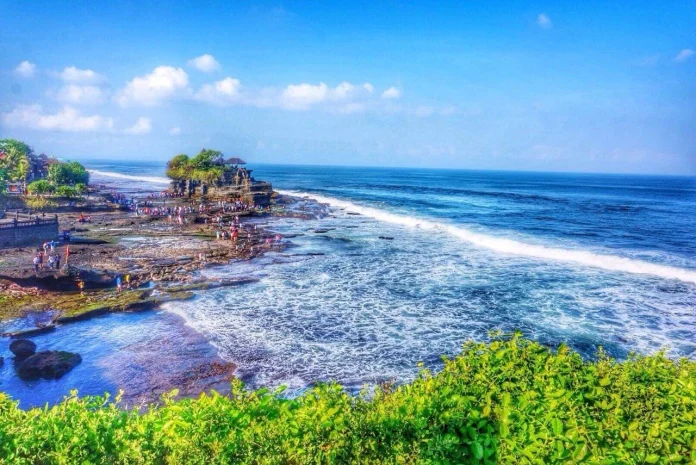Mark once saw stunning photos of Bali online and set off on a trip full of anticipation. However, due to a lack of understanding of local customs, he embarrassed himself at a temple and missed out on hidden off-the-beaten-path beaches. In fact, with over 6 million tourists flocking to Bali each year, many find themselves with similar regrets. Here are 10 crucial tips to help you fully experience the charm of Bali.
Tip 1: Choose the Right Travel Time
The dry season from April to September offers clear skies and minimal rainfall, making it perfect for outdoor activities like surfing and volcano trekking. During this period, the sunset at Jimbaran Beach is truly spectacular, with the orange-red glow of the setting sun reflecting off the fine sandy beach—ideal for capturing picture-perfect moments. For those trekking Mount Batur, starting at around 5 am allows you to reach the summit with the first rays of sunlight and enjoy a breathtaking view of the volcanic lake.
From October to March, the rainy season brings frequent showers but rewards visitors with lush, terraced rice fields. Tegallalang Rice Terrace, for example, transforms into a vibrant green landscape interwoven with coconut trees after the rain. What’s more, hotel prices drop by an average of 30% during this time. Staying at a countryside guesthouse near the terraces offers a scenic view right from your window, providing excellent value for money.
Tip 2: Understand the Visa Policy
Chinese passport holders enjoy a 30-day visa-free entry to Bali, which is extremely convenient. When entering the country, ensure you have a confirmed return ticket, hotel reservation, and a passport valid for at least six months with sufficient blank pages for stamps. Note that the visa-free stay cannot be extended. Overstaying incurs a penalty of 1 million Indonesian Rupiah (approximately 450 RMB) per day. Additionally, since 2024, Bali has imposed an entrance fee of 150,000 Indonesian Rupiah (about 68 RMB) on international tourists, allowing multiple entries within 60 days after payment, which is separate from the visa process.
Tip 3: Plan Your Island Transportation
Chartering a car is the most convenient way to get around the island, costing roughly 300,000 – 500,000 Indonesian Rupiah per day. It’s advisable to book through a reputable travel agency to avoid potential disputes. For those who prefer more freedom, renting a motorcycle at around 70,000 Indonesian Rupiah per day is a great option. However, keep in mind that Indonesia drives on the left side of the road. Always wear a helmet and pay close attention to traffic rules, as Bali’s roads can be narrow, winding, and challenging to navigate.
Tip 4: Set a Realistic Budget
Accommodation costs vary widely. Budget guesthouses range from 150 – 300 RMB per night, such as the rice field guesthouses in Ubud, where you can wake up to the sounds of frogs and birds. Luxury resorts start at 800 RMB and offer amenities like private infinity pools with stunning Indian Ocean views, like those in Uluwatu.
For dining, local street food stalls charge 20 – 50 RMB per meal, and you must try specialties like bebek betutu (roasted duck) and babi guling (roast suckling pig). Upscale restaurants cost around 80 – 150 RMB per person. Imagine enjoying a candlelit dinner at a beachfront restaurant in Kuta, with the sound of waves in the background—it’s a romantic experience not to be missed.
Transportation-wise, a week-long car charter may cost 1500 – 2500 RMB, while a one-day Mount Batur trekking tour is about 300 – 500 RMB. In total, expect to spend around 4000 – 7000 RMB per person for a 7-day trip. Of course, costs will increase if you opt for a more luxurious experience.
Tip 5: Discover Unique Ways to Explore Attractions
At Uluwatu Cliff, besides admiring the magnificent sunset, you can join a yoga class on the cliff platform. Every morning, professional yoga instructors guide participants through sessions with the ocean waves crashing below and the sea breeze in your ears, providing a truly immersive relaxation experience.
For Tirta Gangga Water Palace, visit early in the morning to avoid the crowds. Stroll along the lotus pond and participate in the local blessing ritual, where people use coconut shells to scoop holy water and pour it over their heads for good luck.
In the central village of Manggis, you can experience traditional cockfighting (make sure it’s legal). Feel the excitement and passion of this ancient sport as the villagers cheer. At the coffee plantations on the outskirts of Ubud, get hands-on experience making luwak coffee, from selecting coffee beans to roasting and grinding, and savor the unique flavor of the coffee you’ve made.
During the rainy season, a trek to Mount Batur reveals a misty, ethereal landscape around the volcanic lake, and you might even spot the rare Javan warty pig along the way.
Tip 6: Avoid Common Scams
Some massage parlors lure tourists in with low prices but then demand exorbitant tips at the end. A traveler once paid 100,000 Indonesian Rupiah for a service as advertised, only to be forced to pay 500,000 Rupiah upon checkout. To avoid this, choose well-known, reputable chain massage stores like Jari Menari, which offer professional services in a comfortable environment.
When it comes to transportation, unlicensed taxi drivers may take detours to inflate fares. Using ride-hailing apps like Go-Jek or Grab can prevent such issues, as these apps also provide fare estimates in advance.
Tip 7: Respect Local Customs
When visiting temples in Bali, dress modestly with clothes that cover your knees to show respect for local religious customs. Although you can rent a sarong at the temple entrance if needed, it’s often expensive, so it’s better to bring appropriate clothing with you. In religious sites, behave respectfully, speak softly, and don’t enter restricted areas without permission. Avoid climbing on temple structures or walls. When at the beach, refrain from catching marine life or stepping on coral reefs to protect the local natural environment.
Tip 8: Prioritize Water Safety
Bali offers a plethora of water activities, but safety should always come first. Choose licensed tour operators and participate in water sports under professional guidance. Before diving, receive proper training, familiarize yourself with the equipment, and learn basic lifesaving skills. Always wear a life jacket when in the water.
Keep a close eye on weather conditions and tide schedules, and never venture into the sea during dangerous periods or in unopened areas. For example, at Kelingking Beach on Nusa Penida, the strong currents have led to several accidents, so extra caution is advised. Elderly travelers, those with pre-existing medical conditions, and minors should carefully assess their physical condition before engaging in water activities.
Tip 9: Secure Your Documents and Belongings
Stay vigilant throughout your trip and avoid flaunting valuable items. Try not to go out alone at night and be aware of your surroundings to prevent theft and robbery. Make copies of important documents like your passport in advance in case of loss or theft.
Upon arrival in Bali, inform your family of your hotel name, travel companions’ contact details, and keep your phone charged and connected so that you can stay in touch. In case of an emergency, you can quickly seek help.
Tip 10: Utilize Practical Tools
For travel apps, Go-Jek is a versatile platform that offers ride-hailing, food delivery, motorbike rentals, and even ticket bookings for attractions. TripAdvisor provides authentic reviews of attractions and restaurants, helping you avoid overhyped “网红景点”. Airbnb allows you to book unique accommodations, from seaside villas to jungle cottages, for an immersive local experience.
For inquiries, contact the Bali Tourism Information Center at +62 361 – 754508, which offers multilingual services. In case of disputes or emergencies, call the Indonesian Tourist Police at 110, and for medical emergencies, dial 118.
Do you want to know more about Bali’s hidden gems? Share your questions in the comments! Stay tuned for more travel guides to off-the-beaten-path destinations in Southeast Asia. May your journey in Bali be filled with unforgettable surprises and beautiful memories!























